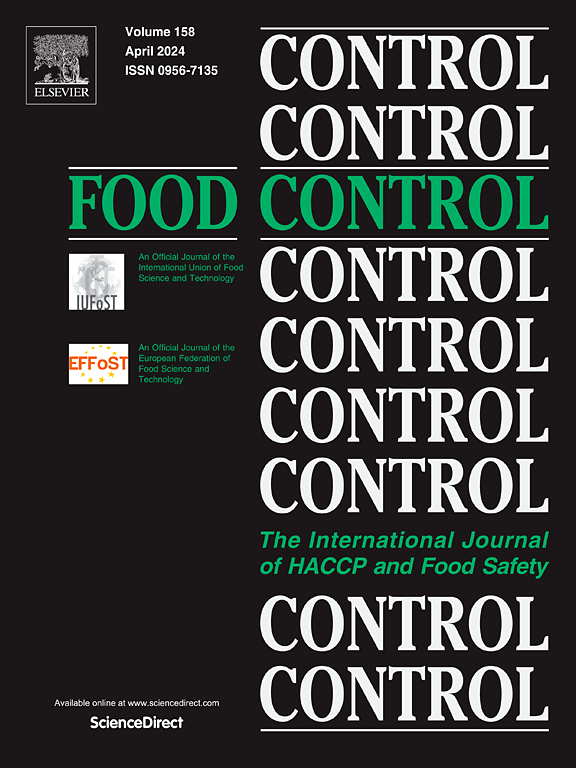Fuzzy logic-based barcode scanning system for food products halal identification
IF 6.3
1区 农林科学
Q1 FOOD SCIENCE & TECHNOLOGY
引用次数: 0
Abstract
Halal status in food products is fundamental for Muslims and may be crucial for those who are allergic to non-halal ingredients when choosing suitable foods for consumption. However, with the rising demand for food products and the advancement of science and technology, contamination with non-halal substances is likely to occur in food production. Furthermore, some irresponsible food industry players tend to replace halal with non-halal ingredients to reduce costs. Therefore, it is crucial to identify the contents of halal food products to ensure compliance with the guidelines outlined by the Department of Islamic Development Malaysia (JAKIM). In this study, an integrated fuzzy logic barcode scanning system was developed to determine non-halal ingredients and traces in packaged food products. Although the information on food products can be easily accessed from the open-source web data bank, using the proposed fuzzy logic based-barcode scanning system to identify the authenticity of halal food products is an alternative option for providing accurate, reliable, and fast detection. The inputs for the fuzzy logic framework are halal logo, alcohol, animal fats, gelatin, ham, bacon, L-cysteine, lipase, mono-and diglycerides, pepsin, rennet, sodium stearoyl lactylate, vanilla extract, whey, and E-code of E120, E422, E441, E470, E542, and E904. On the other hand, the outputs are halal, uncertain, and non-halal. The fuzzy logic-based barcode system was able to identify the halal status for three different categories: samples with a halal logo, uncertain halal status samples, and non-halal samples.
基于模糊逻辑的食品清真识别条形码扫描系统
食品中的清真成分对于穆斯林来说至关重要,对于那些对非清真成分过敏的人来说,选择合适的食品食用也至关重要。然而,随着对食品需求的增加和科学技术的进步,食品生产中很可能会出现非清真物质污染。此外,一些不负责任的食品行业从业者为了降低成本,往往会用非清真配料代替清真配料。因此,识别清真食品的成分以确保符合马来西亚伊斯兰发展部(JAKIM)的指导方针至关重要。在这项研究中,开发了一个综合模糊逻辑条形码扫描系统,用于确定包装食品中的非清真成分和痕量。虽然食品信息可以很容易地从开放源码的网络数据库中获取,但使用所提出的基于模糊逻辑的条形码扫描系统来识别清真食品的真伪,是提供准确、可靠和快速检测的另一种选择。模糊逻辑框架的输入为清真标识、酒精、动物脂肪、明胶、火腿、培根、L-半胱氨酸、脂肪酶、单甘酯和二甘酯、胃蛋白酶、凝乳酶、硬脂酰乳酰酸钠、香草提取物、乳清,以及 E120、E422、E441、E470、E542 和 E904 的 E 代码。另一方面,输出为清真、不确定和非清真。基于模糊逻辑的条形码系统能够识别三个不同类别的清真状态:带有清真标识的样品、清真状态不确定的样品和非清真样品。
本文章由计算机程序翻译,如有差异,请以英文原文为准。
求助全文
约1分钟内获得全文
求助全文
来源期刊

Food Control
工程技术-食品科技
CiteScore
12.20
自引率
6.70%
发文量
758
审稿时长
33 days
期刊介绍:
Food Control is an international journal that provides essential information for those involved in food safety and process control.
Food Control covers the below areas that relate to food process control or to food safety of human foods:
• Microbial food safety and antimicrobial systems
• Mycotoxins
• Hazard analysis, HACCP and food safety objectives
• Risk assessment, including microbial and chemical hazards
• Quality assurance
• Good manufacturing practices
• Food process systems design and control
• Food Packaging technology and materials in contact with foods
• Rapid methods of analysis and detection, including sensor technology
• Codes of practice, legislation and international harmonization
• Consumer issues
• Education, training and research needs.
The scope of Food Control is comprehensive and includes original research papers, authoritative reviews, short communications, comment articles that report on new developments in food control, and position papers.
 求助内容:
求助内容: 应助结果提醒方式:
应助结果提醒方式:


